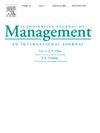When meta-organizations fall asleep: The dormancy process
IF 2
4区 管理学
Q3 MANAGEMENT
引用次数: 0
Abstract
In response to external adversity, organizations often employ dormancy as a defensive strategy. Dormancy, as the substantial reduction of activities, carries profound implications for understanding meta-organizations (MOs) passivity. While MOs possess the power to orchestrate collective action and impact their external environment, their intricate internal dynamics can lead to conflicts, potentially undermining their effectiveness. This research explores the composite process related to MO dormancy and highlight the entry into dormancy marked by paradoxical hyperactivity, enduring dormancy due to exhaustion and over-centralization, and overcoming dormancy through controlled deceleration. The study suggests a less conscious nature of dormancy and the importance of temporality in understanding this complex phenomenon and MO’s internal dynamics.
当元组织入睡时:休眠过程
为了应对外部逆境,组织经常采用休眠作为防御策略。休眠,作为活动的大量减少,对理解元组织(MOs)的被动性具有深远的意义。虽然mo拥有协调集体行动并影响其外部环境的权力,但其复杂的内部动态可能导致冲突,从而潜在地破坏其有效性。本研究探讨了与MO休眠相关的复合过程,并强调了以矛盾的过度活跃为特征的休眠进入,由于疲劳和过度集中而持续休眠,以及通过控制减速来克服休眠。该研究表明,休眠的无意识性质和时间性在理解这一复杂现象和MO内部动态方面的重要性。
本文章由计算机程序翻译,如有差异,请以英文原文为准。
求助全文
约1分钟内获得全文
求助全文
来源期刊

Scandinavian Journal of Management
MANAGEMENT-
CiteScore
4.00
自引率
10.00%
发文量
36
审稿时长
71 days
期刊介绍:
The Scandinavian Journal of Management (SJM) provides an international forum for innovative and carefully crafted research on different aspects of management. We promote dialogue and new thinking around theory and practice, based on conceptual creativity, reasoned reflexivity and contextual awareness. We have a passion for empirical inquiry. We promote constructive dialogue among researchers as well as between researchers and practitioners. We encourage new approaches to the study of management and we aim to foster new thinking around management theory and practice. We publish original empirical and theoretical material, which contributes to understanding management in private and public organizations. Full-length articles and book reviews form the core of the journal, but focused discussion-type texts (around 3.000-5.000 words), empirically or theoretically oriented, can also be considered for publication. The Scandinavian Journal of Management is open to different research approaches in terms of methodology and epistemology. We are open to different fields of management application, but narrow technical discussions relevant only to specific sub-fields will not be given priority.
 求助内容:
求助内容: 应助结果提醒方式:
应助结果提醒方式:


